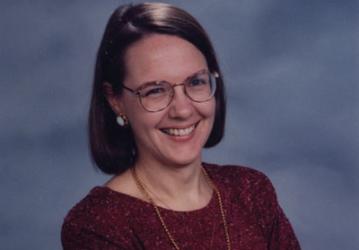 In the early 1980s, Laura (Steichen ’75) Berquist began homeschooling her six children. Quietly. Unassumingly. She never dreamed that her experience would lead to a hot-selling book, a consulting business, and more speaking invitations than she can handle. But it has.
In the early 1980s, Laura (Steichen ’75) Berquist began homeschooling her six children. Quietly. Unassumingly. She never dreamed that her experience would lead to a hot-selling book, a consulting business, and more speaking invitations than she can handle. But it has.
Laura and her husband, Marcus R. Berquist, one of the College’s founders, had decided when their children were small to pursue the homeschooling alternative. She had come across Dorothy Sayers’ essay, The Lost Tools of Learning, which describes the development of learning in children. The article resonated with her own ideas about education, but lacked references to specific curriculum materials. “I knew how my children should learn, but I didn’t know in detail what they should read for science and history and so forth,” she said.
So she started experimenting. She found what worked and what did not. She was drawn to classical texts.
In 1994, fellow schoolmate Margaret (Boersig ’81) Mason invited Laura to speak on classical education at a homeschooling conference in Virginia. Margaret asked her to prepare a hand-out in advance. “I got carried away,” Laura says. “My outline kept getting longer and longer; with pages of recommended works for each grade level, it became a book.”
She also re-read Sayers’ essay and found, through her lived experience, how perceptive it was. She wanted to share those insights with others. She attended the conference and brought along Designing Your Own Classical Curriculum, a book that included the curricular particulars that Sayers’ essay lacked.
Her first homespun publication sold 2,000 copies quickly. Bethlehem Books then marketed her book and by its third printing had sold 5,000 more. Ignatius Press later took over its publication with an expanded section on high school curricula. By Christmas, 1998, just two months after release, sales were above 2,000. Her book even won third place in a readers’ poll in Practical Homeschooling, the flagship magazine of the bustling homeschooling movement.
Mrs. Berquist is surprised by the book’s success. “It’s all common sense. Much of what’s in there is what people are doing anyway,” she says.
“People forget that the primary end of marriage is the procreation and education of children. That means the things you are moved to do regarding the education of your children come from the grace of the sacrament. Education is really a charism of the marriage sacrament.”
Laura soon hit the homeschooling lecture circuit and was featured on EWTN. She was besieged with calls from people who wanted practical advice. A professional educator who ran a secular independent-study program convinced her to develop a similar program where she could offer homeschooling consulting services.
The two thus formed Mother of Divine Grace School, which has grown to include 4,000 students from 1,250 families across the country and Europe. Eighty-two other experienced homeschooling consultants work for her, and 127 teachers. She has since cut down her speaking engagements to about eight per year.
Ignatius Press has published a second book by Mrs. Berquist, The Harp and Laurel Wreath — Poetry and Dictation For the Classical Curriculum. “The book contains the poems recommended in my first book. It also has a section designed for older children who can see the power and beauty of language and so can understand and appreciate poetry and verse,” she says.
Naturally Mrs. Berquist’s work aims to bring students to Thomas Aquinas College, and her own children are proof of her success. All six have gone to graduate from the College.







